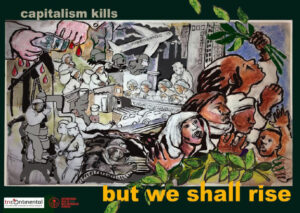Frederick Engels wrote his pamphlet ‘Socialism: Utopian and Scientific’, in 1880. It is a masterpiece, which every revolutionary should read and study. Although it was written over a century ago, its ideas are still relevant today.
The pamphlet is in three parts i.e. The Development of Utopian Socialism, Dialectics and Historical Materialism while the third one is a detailed analysis of the development of capitalism and the way it works. Part three of which this article dwells on explains very well how the contradictions within the capitalist system leads inevitably to social contradictions. For example, Engels argues that under capitalism the major economic contradiction is between socialised production and private appropriation, which manifests itself in the social contradiction between workers and the capitalists. When these contradictions heighten, forces of production are fettered by the system and this results in crises, which, Engels argues, is inevitable under the capitalist system. All the laws of production and distribution of commodities are turned upside down and the circulation of commodities is temporarily stopped. This, he says, is when the mode of production (capitalism) is in contradiction with the mode of exchange. This contradiction can only be resolved by socialism and therefore calling for a catalyst to effect the systematic change (socialism). It is socialism that unfetters the forces of production and develops them in a more effective way than capitalism
Preliminary Transformation into Capital
When analyzing the crises in capitalism, Engels argues that under capitalistic society, the means of production can only function when they have undergone a preliminary transformation into capital. To enable us to expound further on this, there is a need to understand the word ‘capital’, which can be defined in simple terms as money meant to generate profit through the production of commodities. Therefore, preliminary transformation into capital means that for anything to be produced under capitalism, as Bob Avakian the Chairman of the Revolutionary Communist Party, USA says, it has to go ‘through the dynamics of how the capitalist system operates i.e. there has to be investment in a way that turns that investment into capital’1 . It would therefore be absurd to believe that a capitalist government can provide services without transforming social wealth into capital.
In Kenya, the majority of the people are unable to meet their basic needs, including medical services, food, shelter or education. These are services that should be a priority for any government but due to the rules of capitalism which require firstly, the preliminary transformation into capital – there is no way they can be provided without factoring in the profits. This is one of the reasons the so called The Big 4 Agenda (Food Security, Affordable Housing, Manufacturing and Affordable Healthcare) will not succeed in meeting the social needs of the people as claimed by the neocolonial regime in Kenya. For example, under the affordable housing project, the government has partnered with the Kenya Mortgage Financing Company under a Public Private Partnership (PPP) in a plan to build one million houses by 2022. The project has started in Nairobi where some residents are being forcefully evicted from the houses they have lived in for decades in readiness for the construction of new ones. Both national and county governments have been ostensibly assuring residents that they will be the ones to be given first priority once the houses are complete. But this is a deceptive tactic to mislead residents. This is because there are private players in the project who are putting money in the project so as to generate profit. This means that there is no way that a capitalist government or any investor will cater for the needs of people at the expense of profit. As a result, only those residents who have money will benefit from the new houses. The poor will be forced to vacate their houses and will have to leave their homes. They will inevitably end up in informal settlements or poor neighborhoods.
Under socialism, things are usually different. Government focuses more in meeting the needs of its people. It thus plans and prioritises the things that the people need most – free or heavily subsidised housing – as opposed to the situation in a capitalist state where profit is prioritized. For example, in recent times the Kenyan government has mostly focused on infrastructure (expanding and upgrading Jomo Kenyatta International Airport, constructing the New Standard Gauge Railway, among others) while giving lip service to the things that matter most for the majority of the population (food production, health services, education). The government justifies this by giving out estimates of the revenue that will be generated by the infrastructure projects upon completion. The information is packaged in such a way that that ordinary people believe that infrastructures are what are needed most to improve their lives even as a majority of them face food shortage. The Kenyan media, mostly owned and controlled by the ruling class, is also used to sell this false argument and narrative. This, however, does not mean that a socialist government doesn’t focus on improving infrastructures but it programmes are largely driven by the actual needs of the people. Under socialism, infrastructures are built to facilitate the delivery of services to the people and not to reinforce speculative capitalism or for profit. Social wealth under a socialist government does not undergo the preliminary transformation into capital. It immediately goes into meeting the needs of the people.
Endnote
- Revcom. US, (2012). “Preliminary Transformation into Capital”… And Putting an End to Capitalism (online) Available at: https://revcom.us/quick/265en.php#a2 ( Accessed 2 Apr. 2020)

